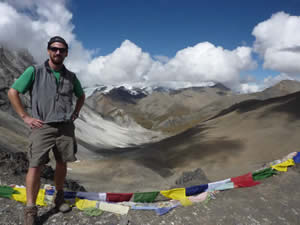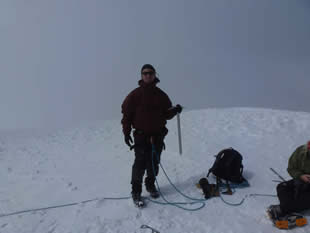Gregory Pierce, who graduated with a MA from the Department of Anthropology in 2012, has been awarded one of two available PhD positions in the Division of Human Ecology at Lund University in Sweden.
The top ranked candidate from an international pool of 58 applicants, Gregory will be funded by the Lund University Centre of Excellence for Integration of Social and Natural Dimensions of Sustainability (LUCID), a Linnaeus program sponsored by The Swedish Research Council. His award, which will commence upon his arrival to Sweden in early September, covers four years of research and salary and will culminate in the defense of his dissertation.
Gregory’s research at Lund, under the supervision of division head Professor Alf Hornborg, will explore the extent to which the ‘vulnerability’ to natural hazards of agro-pastoral groups dwelling through remote areas near the Kanchenjunga massif (28,051 ft) on the border of Nepal and Sikkim (India) in the Eastern Himalayas has since the mid-20th century been increasingly shaped by systemic social, cultural, economic and political processes that are spatially, and as modeled through these processes also temporally, far-removed from those groups’ local experiences of such hazards. Critical to this inquiry will be an examination of how current discourse framing the integration of disaster risk management/reduction (DRM/R) and climate change adaptation (CCA) that has emerged through these same processes obscures the real, physical flows of materials and energy through the global economic system. In this way, Gregory proposes to show that the distributional asymmetries of development that characterize the exploitative structures undergirding these processes are sustained.
This will not be the first time Gregory has conducted fieldwork in the high Himalayas, as the highlight of his time as an anthropology student at CSU came in the fall of 2010 when he planned and led a 10-week study among the ethnically and culturally Tibetan Dolpo-pa in Nepal’s Midwestern highlands. This study, which was partially funded through a graduate fellowship from the Center for Collaborative Conservation in the Warner College of Natural Resources, investigated how the Dolpo-pa’s cultural models of uncertainty and change are themselves rapidly altering with the onset of readily perceptible changes to their mountain environment as a result of shifts in atmospheric and social climates. Data from this research provided the foundation for Gregory’s MA thesis, The Vitality of Ice and Bone: Known Uncertainty and Awareness in Change Through Dolpo, Nepal.
Though conducting this study among the Dolpo-pa represents his most challenging experience abroad, it was certainly not Gregory’s first time overseas. Since studying in Ireland while completing his BA in English at St. John’s University (MN), Gregory has lived or traveled in upwards of 40 countries (he isn’t exactly sure how many). His first time in Asia came in 1996 when he took a position as a teacher in South Korea a month after completing his first MA (in English). He ended up living in Korea for a total of nearly three years. The high point of this period of his life was when in the summer of 1997 he took the long way home from Korea, traveling over seven weeks by rail from Shanghai to Paris (including on the Trans-Siberian Railway) before flying back to the US for a few weeks only to complete this first round the world trip when he returned to Korea to begin a position at Chonbuk National University a few weeks later. In 1999, he joined the Peace Corps and saw in the new millennia as a volunteer in the Caucus Mountains of Armenia.
Moving to Boulder in 2004, Gregory increasingly strove to transition from teaching post-secondary English writing and literature to focusing on his long-present and growing interests in cultural, social and environmental studies. This transition was facilitated by countless hours of reading along with a heaping helping of happenstance while hanging out in a coffee shop. As those who know him know, Gregory loiters in coffee shops for hours each day, sipping Earl Grey and (as he says) “working.” As happenstance would have it, the coffee shop in which he wound up loitering in Boulder was also a hangout for Dr. Michael H. “Mickey” Glantz, a world-renowned social scientist working on climate and hydrometeorological issues and (at the time) a senior scientist at the National Center for Atmospheric Research (NCAR). Knowing Gregory’s interests, the coffee shop manager (who, by the way, consented to marry him in 2009) introduced the two one slow Friday evening, and over the weeks that followed Gregory asked countless questions of Dr. Glantz whenever they crossed paths (at the coffee shop . . . almost daily). For his part, Dr. Glantz, who is now the Director of the Consortium for Capacity Building (CCB), an educational and outreach center focused on the social dimensions of hydro-meteorological hazard events and located in INSTAAR on the campus of the University of Colorado, Boulder, soon realized the extent of Gregory’s interest and dedication and asked him to conduct a small research project for him. This was nearly six years and a host of much more involved projects ago.
Gregory is currently a Senior Researcher with CCB. From the beginning, he has been asked not only to provide substantive research and support to the center but also to use his English skills as its primary editor of educational outputs, grant applications, articles and books. As a core member of CCB, he has also had many opportunities to travel far afield across the spaces of the world, as in 2008 when he made a field visit to Xinjiang Province in far Western China and then spent over three months in Beijing working with the Institute for Geographic Sciences and Natural Resources Research (IGSNRR) at the Chinese Academy of Science (CAS) and in 2009 when he presented a field-based educational concept called SpareTime University at the International Conference on Community-Based Adaptation to Climate Change in Dhaka, Bangladesh. Upon returning to Kathmandu after completing his field study in the fall of 2010, he was tasked with providing liaison support as an in-country representative of CCB in co-organizing with its primary local collaborator, The Small Earth Nepal, the first Graduate Conference on Climate Change and People, which drew over 150 participants from 17 countries across Greater South Asia. At the conference, Gregory chaired sessions on Indigenous Knowledge and Social Networking, and his presentation on Community Resilience, Power and the Construction of Knowledge was voted by participants as one of the three best of the entire week-long conference.
Since defending his thesis in December of 2011, Gregory has kept very busy. In April, for instance, he was invited to teach a 3-credit graduate course on the socio-cultural dimensions of climate impacts and adaptations at Mekelle University in Northern Ethiopia. In the spring, he also took on the role of project lead in the development of a graduate degree program at Tribhuvan University in Kathmandu that will focus on the interconnections between social and natural science issues in mountain areas (focusing on the Himalayas). Currently, he is working closely with Dr. Glantz and their international team of collaborators on a major survey of the activities in Asia, Africa and South America over the past several years of USAID’s Office of Foreign Disaster Assistance (OFDA). In this nearly million-dollar activity, CCB has been commissioned to examine how to incorporate lessons learned from DRR activities into more effective operationalization of OFDA assistance in times of hydro-meterological disaster.
Gregory learned that he had received the position at Lund on June 5, his 40th birthday. Somehow fittingly, he was at the time ushering in his middle ages on a solo camping trip in Iceland, where he trekked across Europe’s largest glacier to summit Hvannadaslshnjukar, the highest peak on the island, and took a dip in the Arctic Ocean off Grimsey Island just north of the circle. Apparently, he was already preparing himself for several years in Scandinavia when he received the news.
The Department of Anthropology wishes him all the best as he begins this new chapter (and decade) of his life, wherever it happens to take him next.

